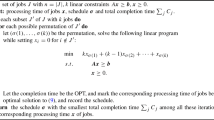Abstract
The correctness of a real-time system depends on not only the system’s output but also on the time at which results are produced. A hard real-time system is required to complete its operations before all its timing deadlines. For a given task set it is useful to know what changes can be made to a task that will result in a system that is borderline schedulable. It is also beneficial in an engineering context to know the minimum speed of a processor that will deliver a schedulable system. We address the following sensitivity analysis (parameter computations) for EDF-scheduled systems on a uniprocessor: task execution times, speed of the processor, task periods and task relative deadlines. We prove that an optimal (minimum or maximum) system parameter can be determined by a single run of the Quick convergence Processor demand Analysis (QPA) algorithm. This algorithm provides efficient and exact sensitivity analysis for arbitrary deadline real-time systems. We also improve the implementation of this sensitivity analysis by using various starting values for the algorithms. The approaches developed for task parameter computations are therefore as efficient as QPA, and are easily incorporated into a system design support tool.
Similar content being viewed by others
References
Aydin H, Melhem R, Mosse D, Mejia-Alavrez P (2001) Dynamic and aggressive scheduling techniques for power-aware real-time systems. In: Proceedings 22nd IEEE real-time systems symposium, pp 95–105
Balbastre P, Ripoll I, Crespo A (2002) Schedulability analysis of window-constrained execution time tasks for real-time control. In: Proceedings of the 14th euromicro conference on real-time systems, pp 11–18
Balbastre P, Ripoll I, Crespo A (2007) Analysis of window-constrained execution time systems. Real-Time Syst 35(2):109–134
Balbastre P, Ripoll I, Crespo A (2008) Minimum deadline calculation for periodic real-time tasks in dynamic priority systems. IEEE Trans Comput 57(1):96–109
Balbastre P, Ripoll I, Crespo A (2009) Period sensitivity analysis and D-P domain feasibility region in dynamic priority systems. J Syst Softw 82(7):1098–1111
Baruah SK, Mok AK, Rosier LE (1990) Preemptively scheduling hard-real-time sporadic tasks on one processor. In: Proceedings 11th IEEE real-time system symposium, pp 182–190
Bini E, Buttazzo G (2009) The space of EDF deadline: the exact region and a convex approximation. Real-Time Syst 41(1):27–51
Bini E, Buttazzo G, Lipari G (2005) Speed modulation in energy-aware real-time systems. In: Proceedings of the 17th euromicro conference on real-time systems, pp 3–10
Bini E, Buttazzo G, Lipari G Minimizing CPU energy in real-time systems with discrete speed management. ACM Trans Embed Comput Syst 8(4) (2009)
Bini E, Natale M, Buttazzo G (2006) Sensitivity analysis for fixed-priority real-time systems. In: Proceedings of the 18th euromicro conference on real-time systems, pp 13–22
Buttazzo G, Lipari G, Abeni L (1998) Elastic task model for adaptive rate control. In: Proceedings IEEE real-time systems symposium, pp 286–295
Dertouzos ML (1974) Control robotics: the procedural control of physical processes. In: Proceedings of the IFIP congress, pp 807–813
Harbour M, Garcia J, Gutierrez J, Moyano J (2001) MAST: modeling and analysis suite for real-time applications. In: Proceedings of the 13th euromicro conference on real-time systems, pp 125–134
Hoang H, Buttazzo G, Jonsson M, Karlsson S (2006) Computing the minimum EDF feasible deadline in periodic systems. In: Proceedings 12th IEEE international conference on embedded and real-time computing systems and applications, pp 125–134
Jejurikar R, Gupta R (2006) Optimized slowdown in real-time task systems. IEEE Trans Comput 55(12):1588–1598
Katcher D, Arakawa H, Strosnider J (1993) Engineering and analysis of fixed priority schedulers. Softw Eng J 19(9):920–934
Lehoczky J, Sha L, Ding Y (1989) The rate monotonic scheduling algorithm: exact characterization and average case behavior. In: Proceedings of IEEE real-time systems symposium, pp 166–171
Leung JY-T, Merrill ML (1980) A note on preemptive scheduling of periodic, real-time tasks. Inf Process Lett 11(3):115–118
Punnekkat S, Davis R, Burns A (1997) Sensitivity analysis of real-time task sets. In: Proceedings of ASIAN, pp 72–82
Regehr J (2002) Scheduling tasks with mixed preemption relations for robustness to timing faults. In: Proceedings 23rd IEEE real-time systems symposium, pp 315–326
Ripoll I, Crespo A, Mok AK (1996) Improvement in feasibility testing for real-time tasks. Real-Time Syst 11(1):19–39
Shin Y, Choi K (1999) Power conscious fixed priority scheduling for hard real-time systems. In: Proceedings of the 36th ACM/IEEE conference on design automation, pp 134–139
Spuri M (1996) Analysis of deadline scheduled real-time systems. Technical Report 2772, INRIA, France
Vestal S (1994) Fixed-priority sensitivity analysis for linear compute time models. IEEE Trans Softw Eng 20(4):308–317
Yerraballi R, Mukkamala R, Maly K, Wahab H (1993) Issues in schedulability analysis of real-time systems. In: Proceedings of 7th euromicro workshop on real-time systems, pp 87–92
Zhang F (2009) Analysis for EDF scheduled real-time systems. PhD thesis, Dept of Computer Science, University of York, UK
Zhang F, Burns A (2008) Schedulability analysis for real-time systems with EDF scheduling. Technical Report YCS-426-2008, Dept of Computer Science, University of York, UK
Zhang F, Burns A (2009a) Improvement to quick processor-demand analysis for EDF-scheduled real-time systems. In: Proceedings of the 21st euromicro conference on real-time systems, pp 76–86
Zhang F, Burns A (2009b) Schedulability analysis for real-time systems with EDF scheduling. IEEE Trans Comput 58(9):1250–1258
Zhang F, Burns A, Baruah S (2009) Sensitivity analysis for real-time systems. Technical Report YCS-2009-438, Dept of Computer Science, University of York, UK
Zhang F, Burns A, Baruah S (2010) Sensitivity analysis for EDF scheduled arbitrary deadline real-time systems. In: Proceedings 16th IEEE international conference on embedded and real-time computing systems and applications, pp 61–70
Author information
Authors and Affiliations
Corresponding author
Rights and permissions
About this article
Cite this article
Zhang, F., Burns, A. & Baruah, S. Sensitivity analysis of arbitrary deadline real-time systems with EDF scheduling. Real-Time Syst 47, 224–252 (2011). https://doi.org/10.1007/s11241-011-9124-y
Published:
Issue Date:
DOI: https://doi.org/10.1007/s11241-011-9124-y




